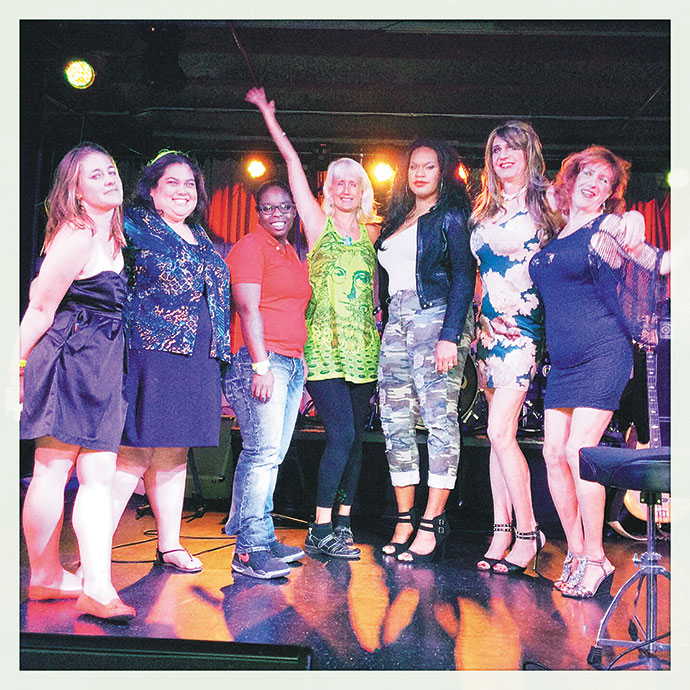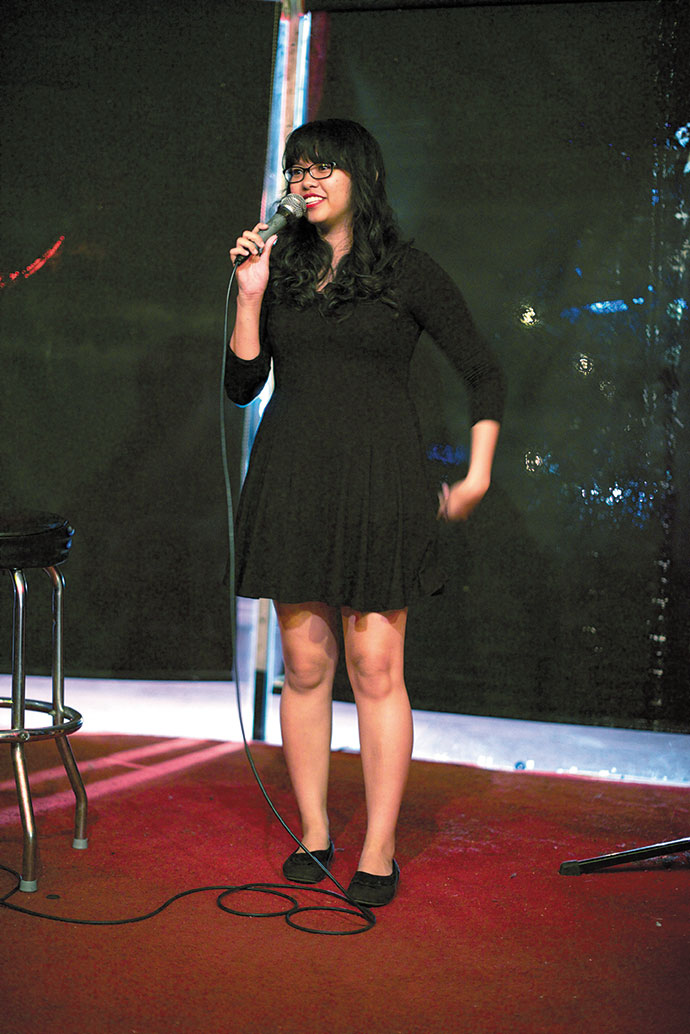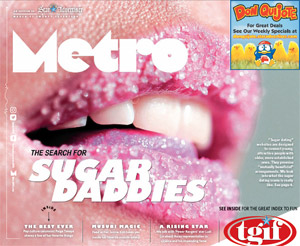Laughter is the best medicine. In that case, I must be a drug dealer.

Some of the members of Female Comics of Hawaii (from left) Maura Sateriale, Kanoe La’a, Porscha, Erika Swartzkopf, Kendra Shine, Brandi Morgan and Patrice Scott
When Bitch Magazine traced the origins of the oft-touted claim that women aren’t funny, it found the first such reference to have appeared in 1695 — penned by a playwright who stated that he had never seen “true humor” in a woman, musing that perhaps it is due to their “natural coldness.” But while his rhetoric may have become antiquated over the centuries, the notion is a persistent one.
With female comedians such as Tina Fey, Amy Poehler, Amy Schumer and Kristen Wiig occupying significant places in the comedy landscape, it should seem clear that such a sweeping statement has no place in our current entertainment world — despite those poorly phrased comments by former Disney executive Michael Eisner earlier this month, which already have faced the wrath of Internet rage.
And, if stand-up comedian collective Female Comics of Hawaii has its way, such allegations have no place locally.
Established by artist-turned-comedian Erika Swartzkopf in 2011, the group was founded with the intent of building up the local comedy scene, while also supporting women comics.
“I have had a lot of great comics in my shows,” Swartzkopf says. “It is about bringing up women comics, and saying, ‘Yes, look, women are funny, too.’”
Female Comics of Hawaii hosts six to eight shows a year, with a rotating set of about 20 performers. At each show, the comedians craft different routines, discussing topics that range from daily life in Hawaii to gender dynamics.
These days, the group is in the throes of expanding and growing its reach. It hosts its next show from 8 to 10 p.m. Aug. 8 at Downbeat Lounge, featuring a string of local comics. Then, on Sept. 6, it throws its inaugural Wahine Comedy Festival at eleven44, marking the first time that the group will bring in comics from the Mainland. California-based Cate Gary and Robin Tran headline the event and are joined by 14 local comedians during the two-show fest (at 7 and 9 p.m.)
“(Women comedians) should be more appreciated,” Swartzkopf asserts.
Swartzkopf discovered stand-up comedy a few years ago when she dropped in on a series of Andy Bumatai shows that ended with an opportunity for audience members to share their best joke. The winner was rewarded with Pop-Tarts and steak knives.
“Giving away knives. In a bar. I was like, I have to see this,” says Swartzkopf, who also is a visual artist and jewelry maker.
Impressed by the routines, Swartzkopf began going regularly — to the point where her presence became a Bumatai punchline in itself. So after a few weeks, Bumatai gave Swartzkopf her first paid gig: a three-minute slot in the show.
“Right in front of one of the most famous comedians. It was terrifying,” she recalls.
After that, as Swartzkopf made the stand-up rounds, the local comedy scene also was beginning to grow, with performers gathering at open mic nights across town. But she noticed that women were noticeably sparse at these events.
“(Female Comics of Hawaii) is a little bit less testosterone,” Swartzkopf says, “which the open mics are chock full of. Stand-up in general is all men.”
While Swartzkopf says that many men in the comedy scene have been supportive — and she also hosts an open mic night at Station Bar & Lounge for comics of any gender — she feels that it’s important to have a group exclusively for women. It allows, she says, for female performers to feel like they have more freedom — and have a space where they feel like they belong.
“There is always the feeling that you are in a guys’ locker room if you are in an open mic as a woman,” Swartzkopf says.
“It was a voice not being heard — the female comedy voice was not being heard,” she adds.
“Most of the people in the comedy scene are male,” says Brandi Morgan, a member of the group who will headline the August show. “By having a female group … it is empowering. It gives (women) a place to go, it gives them a forum.”
Another Female Comics member, Mindy Lipton, recounts how she once heard a male comedian’s explanation for why women comics exist: to fill the gap while the men take a smoke break.
Member Patrice Scott, who will emcee the Wahine Comedy Festival, muses that it’s yet another example of the glass ceiling.
“I don’t really get that one, actually,” Scott says. “I don’t know where that comes from — women are very funny.”
After a beat, she quips: “I guess it’s because we are just so damned good looking that they can’t believe that we can both.”
“Compared to the men, there aren’t many female comedians in Hawaii’s comedy scene,” says Jasmine Bautista, a new member of Female Comics who will perform in the August show.
“Anybody can be funny,” Bautista continues. “But I have heard reasons to why women aren’t considered funny … When a woman does stand-up comedy, it’s not considered to be ladylike … I’ve actually heard a comedian say that he was surprised that women laugh at his jokes, because his humor isn’t ‘feminine.’ What is feminine humor, anyway? Talking about periods and vaginas? Just because I am a woman doesn’t mean I won’t understand your dick joke.”
The September festival, Swartzkopf says, will start small — but it is something that she is hoping to grow over time. Swartzkopf also hopes to establish a regular showcase. Some members of the group also aim to one day open a comedy club.
Although the group exists to bolster female comics, the intention really is to boost the Hawaii comedy scene as a whole.
“(Some comics) want to get better so they can move to Los Angeles or New York and make it big, but I don’t want that — I want everybody to come to me and bring comedy here,” Swartzkopf says.
After all, the old adage that laughter is the best medicine has practical meaning for many Female Comics of Hawaii members — it’s a cure-all that they enjoy sharing with the community at large.
For Morgan, a transgender woman who came out a few years ago, comedy has been an integral part of discovering her identity.
“Doing comedy is kind of my way of owning (being transgender),” Morgan explains. “So I feel that comedy is empowering.”
“I’ve always been and still am a shy person,” Bautista admits. “Having the courage to go up and tell jokes that may or may not be funny was a giant step out of my comfort zone. It’s because of doing stand-up comedy that I’ve learned to be more confident.”
“Humor is healing,” Scott adds. “I want everybody to have more fun in their lives every single day.”
“I try to see the comedy in everything,” says Lipton. “I try to put every negative thing I think into a positive.”
There, is after all, something inherently optimistic about being a stand-up comedian. Some nights, you’ll inevitably bomb — Swartzkopf says everyone does now and then — and be met with a room full of people staring stone-faced back at you. But, the next night, you’ll have to get up in that same spot and try again.
“You know how wonderful it is to make someone laugh?” Lipton says. “There is nothing like it — nothing in the world like it — to make people laugh.”
For more information, visit the Female Comics of Hawaii Facebook page. Tickets for the Aug. 8 show at Downbeat Lounge and the Sept. 6 Wahine Comedy Festival at eleven44 are $10 each at the door.


